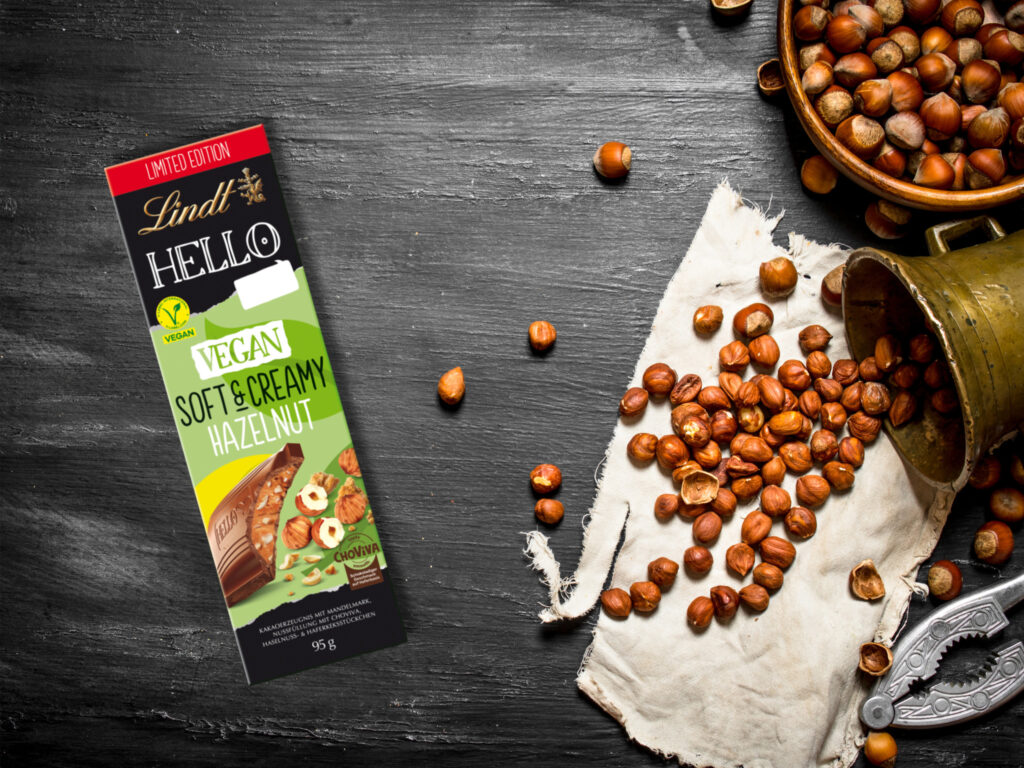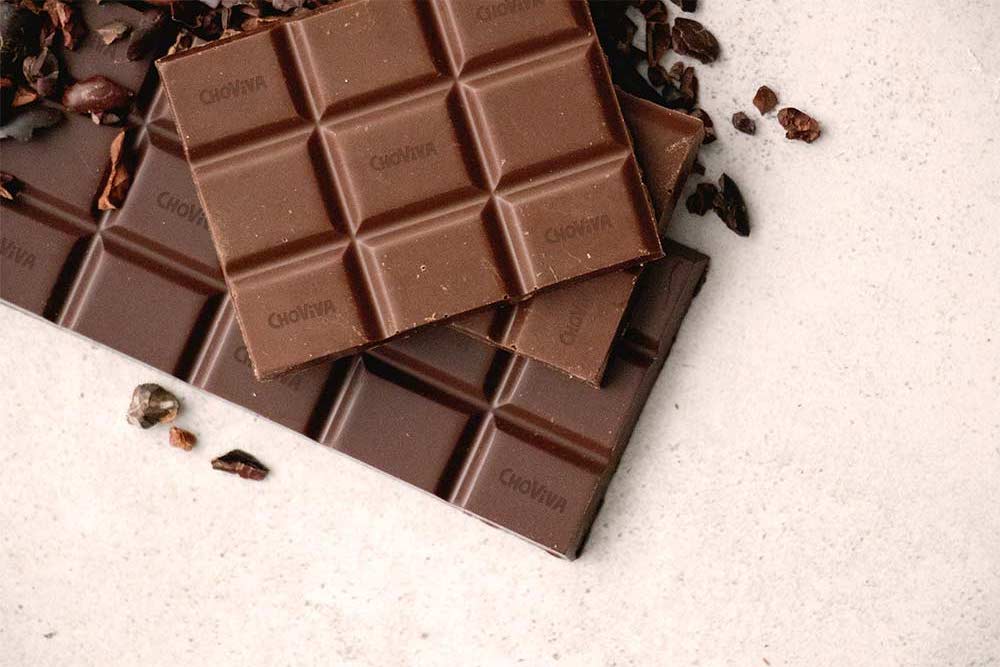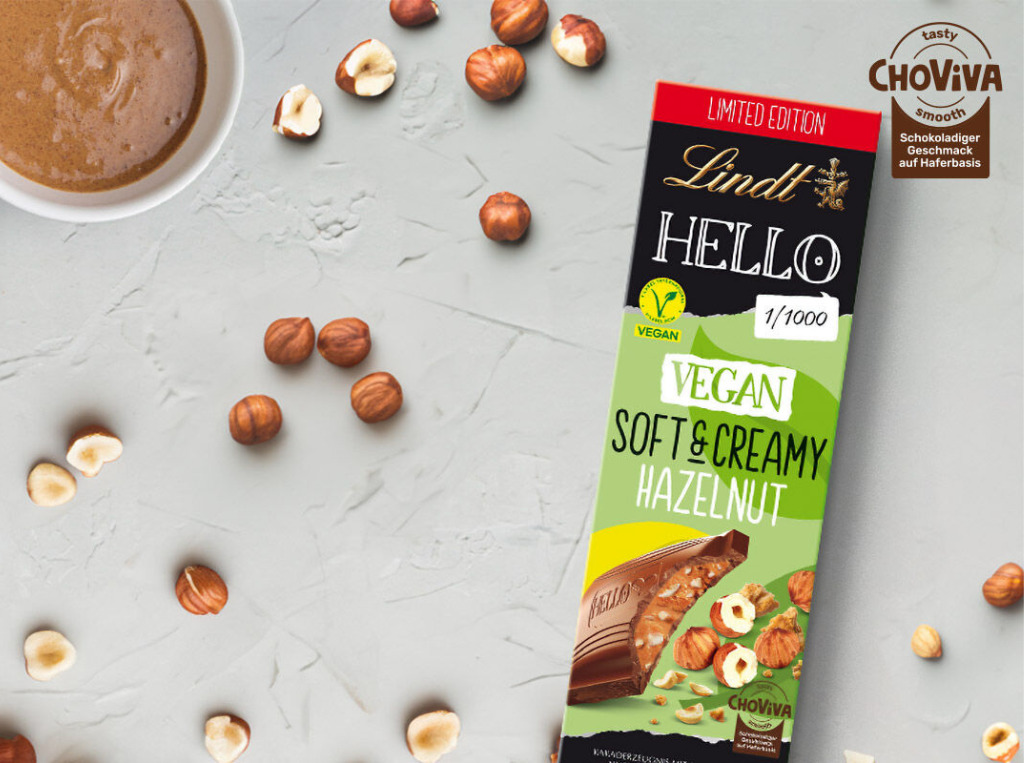5 Mins Read
Chocolate giant Lindt has partnered with German cocoa-free brand ChoViva to launch a limited-edition vegan chocolate bar for Veganuary. There are only 1,000 of the Soft & Creamy Hazelnut bars, which feature Lindt’s Hello Vegan chocolate with a hazelnut and oat crème filling from ChoViva.
Lindt has teamed up with German cocoa-free chocolate brand ChoViva to expand its popular Hello range with a limited-edition vegan Soft & Creamy Hazelnut bar.
The new chocolate, whose run is limited to 1,000 pieces, will be available from January 4 exclusively on Lindt’s D2C webstore, and features ChoViva’s creamy hazelnut and oat crème with hazelnut and oat cookie pieces, coated with the Lindt Hello vegan chocolate.
So while it’s not cocoa-free like the other products in ChoViva’s brand collaborations, it does mark a milestone for the German startup, as teaming up with one of the world’s leading chocolate makers is a route for expansion and success. Additionally, it will help shed light on supply chain issues and chocolate’s problematic carbon footprint.

Chocolate’s multi-pronged problems
Formerly known as NoCoa/QOA, ChoViva is a sub-brand of food tech startup Planet A Foods, uses oats and sunflower seeds and employs traditional fermentation and roasting processes to recreate cocoa’s properties, without the cocoa plant.
According to analysis by CarbonCloud, its chocolate alternative emits 90% less carbon per kg than its conventional counterparts. That’s an attractive asset to producers looking to reduce their impact on the environment and ease cocoa supply chains.
Cocoa beans have one of the highest carbon opportunity costs – the amount of carbon lost from native vegetation and soils to produce a specific food – only trailing behind red meat. Dark chocolate, meanwhile, is the second-worst emitter in the food system, after beef.
The chocolate industry is a major driver of deforestation (with the widespread use of palm oil being a factor too), an issue that has become more prominent in policymaking after the EU banned the import of all cocoa linked to deforestation earlier this year (the UK is working on a similar ban on cocoa associated with illegal deforestation).
Chocolate has been linked to human rights abuses in producing countries as well. In fact, the US government was sued in August to block imports of cocoa harvested by children in West Africa, which has allegedly been used by companies like Hershey’s, Mars and Nestlé. Lindt, which launched its own vegan chocolates in early 2022, has been linked to child labour and deforestation as well.
Moreover, there are supply chain issues to contend with. Scientists have warned that cocoa trees are threatened – and a third of them could die out by 2050 – which could lead to a global chocolate shortage. This makes ChoViva’s partnership with Lindt even more pertinent – the use of the cocoa-free brand’s innovations in mainstream products can relieve supply chain pressures and mitigate the “extremely high cocoa prices that are already becoming a problem due to climate change”.
The new Lindt-ChoViva plant-based bar is priced the same (€3.49) as the six other vegan chocolates under the Hello brand, though it weighs 5g less than the standard 100g. (The range also has a plant-based version of its famous Santa chocolate.) Plus, Lindt recently introduced oat milk versions of its famous Lindor truffles.

Ingredients and plan oil use in the Lindt-ChoViva vegan chocolate
This is ChoViva’s third brand collaboration this year, after rebranding and pivoting to a B2B model (it launched a range of its cocoa-free chocolates at German online retailer Confiserie Seidl in 2021). It has linked up with German oat cereal producer Kölln on three cocoa-free mueslis, as well as biscuit manufacturer De Beukelaer on a vegan cocoa-free Cereola cookie.
“Lindt represents the highest chocolate craftsmanship and best taste, and it feels incredible to create such a great product with such a significant company,” said Planet A Foods co-founder and CTO Sara Marquart.
The new bar contains Lindt’s vegan chocolate base of oat flour, almond paste and millet syrup powder, combined with ingredients like rolled oats, oat kernels and sunflower seeds. Notably, on top of Lindt’s use of cocoa butter, these contain shea fat and palm oil. The latter is a major point of contention, given its links to widespread tropical deforestation and human rights abuses.
Speaking to Green Queen in September, the brand’s co-founder and CEO Max Marquart said palm oil becomes essential for some of its collaborations with industry partners. “If we do so, we support sustainable palm oil cultivation and work with partners who do the same,” he explained, confirming that the palm oil it uses is RSPO-certified, which comes from certified production units and is produced according to strict ecological and social criteria.
“For some special applications, we couldn’t yet get rid of palm oil due to technical reasons. We try to limit those applications,” added Sara, before revealing that ChoViva is working on its own palm oil and fats.

Collaboration over criticism
ChoViva raised $6M in seed financing in 2021, and it hopes its partnership with Lindt will take things to the next level. There are benefits for the Swiss confectionery giant too: cocoa, alongside raw materials like dairy and sugar, and transport and packaging, are the biggest contributors to its climate footprint. It just released its Science Based Targets initiative-approved net-zero goal for 2050, which also involves reducing scope 3 emissions from forest, land and agriculture by 72% from a 2020 baseline. Working with a cocoa-free producer that has a 90% lower footprint is a start.
Another cocoa-free company that boasts 90% lower emissions is London’s WNWN Food Labs. The startup recently released three limited-edition vegan alt-chocolate bars that riffed on the Cadbury Wholenut, Terry’s Orange and Tony’s Chocolonely.
WNWN CEO Ahrum Pak had slammed the “unfair labour practices” and the environmental impact of the originals, but in a statement to trade publication The Grocer, ChoViva’s Max criticised this stance. “Consumers love chocolate and respond poorly to their chocolate being scolded,” he said. “After all, chocolate is a beloved treat for many, and finger-pointing has never been an effective way to change behaviour.”
For ChoViva, collaboration remains a key part of its growth strategy.




